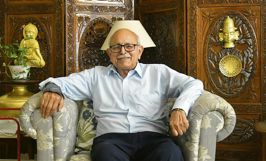At the centre of the film lies the stunning performance by Sandra Huller (right), which keeps you thoroughly engaged.
Film: Anatomy of a Fall
Director: Justine Triet
Cast: Sandra Huller, Swann Arlaud, Milo Machado Graner and Samuel Theis
Johnson Thomas
Justine Triet’s Palme d’Or winner, ‘Anatomy of a Fall’ is deeply involving and thoroughly entertaining despite a two-and-a-half-hour runtime. The narrative does not follow the generic pattern. It unfolds in an unfussy, orderly fashion and yet is captivating. A wife, author and translator by profession, Sandra (Sandra Huller) is an accused in her husband’s suspicious death. Soon after the incident, the no-frills storyline fast-tracks to the courtroom where much of the film plays out.
Sandra and Samuel (Samuel Theis) are a literary couple living in the French Alps. One fine snowy day, not too soon after Sandra has to end her interview with a fan, she hears her blind son, Daniel (Milo Machado Graner), who had gone out for a walk with his dog, cry out. When she rushes out and looks down into the snow, she sees her husband Samuel’s body lying face down with blood spilling onto the snow in the ground. First paramedics and then cops come to the scene, evidence is collected and because of three drops of blood found on the woodshed below the attic window from where he fell, the death looks highly suspicious. All ‘what if’ scenarios are ruled out before the wife is assumed to be the prime suspect for a trial.
Justine Triet, who directed ‘Sibyl’ earlier, clearly had Otto Preminger’s 1959 film ‘Anatomy of a Murder’ on her mind when deciding on a title for this film. Like Perminger’s film, this too is a courtroom drama. The only difference lies in the highly restrained treatment that Triet employs to generate the goodies. The ‘Fall’ in the title refers to the death of the husband as well as the failure of the marriage. The dialogues by Triet and Arthur Harari, which take intermittent turns going through three languages, are sharp and insightful.
As the trial progresses, Daniel begins to understand his parents differently. At one point, he even begins to doubt his mother’s innocence given that the prosecuting lawyers leave no stone unturned to paint her in a suspicious light. Every decision and action over much of the couple’s marriage is scrutinised minutely, with personal baggage coming out of the woodwork merely because Samuel’s death is ruled as inconclusive. Samuel’s therapist testifies that he wasn’t suicidal and the interviewer is asked to throw light on the state of mind of the woman she just met that day. Samuel’s playing of an instrumental version of 50 Cent’s ‘P.I.M.P.’ repetitively and at every turn, is what prompted the end of the interview. Sandra keeps reiterating that all these are just small nuggets of her life. Not the complete picture. But will the court take cognisance of that?
This narrative is dense with dialogues and the structure of the film is fairly complicated. There are layers here that may not be obvious at first glance. What might have been implausible initially suddenly starts to become plausible midway and then again, it swings back. The courtroom post-mortem of the marriage reveals secrets that shadow the decline in the relationship. Resentments, betrayals, infidelity and jealousy are brought to the forefront as the lawyers attack and defend the undertrial. The storyline is neither manipulative nor contrived. It gets edgier as Triet tries to interrogate what transpires between the couple over time and how failure to understand each other as they go along can be detrimental to the well-being of the marriage itself.
It’s heartbreaking to see 11-year-old Daniel grappling with feelings brought on by the turbulence that the questioning of his mother’s character arouses. Milo Machado Graner as Daniel is so compelling that your heart just goes out to him.
And at the centre of it all lies this stunning performance by Sandra Huller, which keeps you captivated for all of this movie’s longish runtime. She internalises the entire experience and we can see it transposed on the screen with an intimate vibrancy that is extremely rare. Hers is a closely calibrated and immersive performance, illuminating in its realism. Every moment in this film is defined by Triet’s sharply-edged narrative, brilliant cinematography, highly effective editing and sound design, and Huller’s captivating ability to live the role as if she were herself on trial. It would be a shame if she does not win an Oscar for this!














